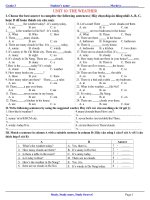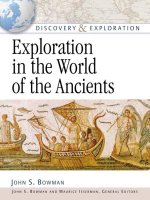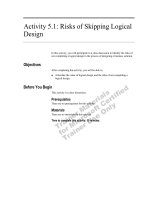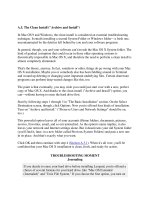Tài liệu Unit 5: The nature of things ppt
Bạn đang xem bản rút gọn của tài liệu. Xem và tải ngay bản đầy đủ của tài liệu tại đây (194.18 KB, 8 trang )
UNIT FIVE
THE N ATURE OF THIN GS
1. READING
VOCABULARY:
1. penguin /
/
peNgwin
/ (n): a black and white bird that lives by the ocean around Antarctica
and cannot fly: chim cánh ct
2. sweater /
/
swetC
/ (n): a warm piece of clothing that covers your upper body and arms: áo len
c chui
3. lover /
/
lVvC
/ (n): someone who likes or enjoys something very much: ngi thích thú hoc
a chung cái gì
4. save /
seIv/ (v): [transitive] to make it possible for someone or something to avoid danger,
harm, injury, etc.: cu vt, cu vãn
Campaigns to save the planet/whale: Các chin dch cu vãn hành tinh / cá heo
5. soak /
sCUk/ (v): [intransitive or transitive] to make something very wet, or to become very
wet: thm nc
The rain soaked our clothes: Nc ma làm t áo chúng tôi.
6. knit /knIt/ (v): [intransitive or transitive] to make something such as a piece of clothing
using wool and sticks called knitting needles: đan, dt
7. in response to: a reaction: đáp li
8. insulation /
Insju
/
leISn/ (n): material used for preventing heat, cold, noise, or electricity
from passing through something: vt cách ly
9. endanger /
In
/
deINdZC
/ (v): to put someone or something into a situation where they might
be harmed: gây nguy him cho ai / cái gì
Smoking endangered your health: Hút thuc có hi cho sc khe.
10. wash into: to flow or carry sb/sth in a particular direction: trôi vào, dt vào
11. habitat /
/
hAbItAt
/ (n): the type of place that an animal normally lives in or a plant
normally grows in: ni c trú
natural habitat: ni c trú t nhiên
12. conservation /
kOnsC
/
veISn
/ (n): the management of land and water in ways that prevent
it from being damaged or destroyed: s bo tn
a wildlife conservation project: d án bo tn đi sng hoang dã
13. hypothermia /
haIpC
/
TC:mIC
/ (v): a serious medical condition in which your body
temperature is very low: s gim th nhit
14. poisoning /
/
pcIZCnIN
/ (n): an occasion when someone is affected by poison: s nhim
đc
mushroom/mercury/chemical/alcohol poisoning: s nhim đc nm rôm / thy ngân/ hóa
cht / ru
15. woolens /
/
wUlCnz
/ (v): clothing made from wool, especially by KNITTING: qun áo len
16. ideal /
aI
/
di:Cl
/ (a): of the best or most appropriate type: lý tng
The fair provides an ideal opportunity for jobseekers and employers to meet: Hi ch to
c hi tuyt vI cho nhng ngi tìm vic và nhng nhà tuyn dng gp g nhau.
17. pick up: (phrasal verb) to get or obtain something: có đc, đt đc
18. broadcast /
/
brc:dkAst
/ (v): [intransitive or transitive] to send out messages or programs
to be received by radios or televisions: phát sóng, phát hình
19. demand /
dI
/
mAnd
/ (n): [uncount] the amount of a product or service that people want, or
the fact that they want it: nhu cu
18,400 new houses will be needed by 2011 to cope with the demand: n nm 2011 cm
18.400 cn nhà mi đ đáp ng đc nhu cu.
demand for: Demand for organic food is increasing.: Nhu cu thc phm hu c đang
gia tng
20. in case: if: nu, trong trng hp
In case you can’t come, give me a call before I leave for work: Nu bn không đn đc,
hãy gi đin cho tôi trc khi tôi tan s.
21. waterproof /
/
wc:tCpru:f
/ (a): waterproof clothes keep you dry because they do not let
rain pass through them: không thm nc
a waterproof jacket: áo ves-tông không thm nc
IN THE KNOW: The penguins of Philip Island are very small, as can be seen in the
photograph. They are also a tourist attraction. They walk along the same pathways from the sea to
their nests every morning, and tourists go to watch them.
2. FOCUS ON GRAMMAR
VOCABULARY:
1. Mongolia: nc Mông C
2. be descended from: to be related to sb who live a long time ago: có ngun gc, có t tiên vi
ai
3. truly /
/
tru:lI
/ (adv): in the most complete, correct, or exact way: tht s, đích thc
She was someone who truly understood children: Cô ta là mt ngi thc s hiu tr em.
4. wild /waIld/ (a): a wild animal or plant lives or grows on its own in natural conditions and
is not raised by humans: hoang dã
The wild rose is a familiar sight in woods and fields: Hoa hng di là hình nh quen
thuc trong nhng nhng cánh rng và đng c.
5. domesticate /
dC
/
mestIkeIt
/ (v): to train an animal to live with or work for humans: thun
hóa, thun chng
6. set aside (phrasal verb): to keep or save something from a larger amount or supply in order to
use it later for a particular purpose: đ riêng ra, đ dành
7. steppe /
step/ (n) a large area of land with grass but few trees, especially in SE Europe and
Siberia: tho nguyên
3. VOCABULARY: PREFIXES
VOCABULARY:
1. reintroduce /
ri:IntrC
/
dju:s
/ (v): to bring back something such as a law, system, or
benefit that had been stopped: REINSTATE: gii thiu
2. coexist /
kCUig
/
zIst
/ (v): to live or exist at the same time or in the same place: cùng sinh
sng, cùng tn ti
3. deforestation /
di:fcrI
/
steISn
/ (n): the process of removing the trees from an area of
land: nn phá rng
4. overfishing (n): fishing too much: nn đánh bt cá quá nhiu
5. misleading /
mIs
/
li:dIN
/ (a: intended or likely to make someone believe something that is
incorrect or not true: đem li nhng ý ngh, v.v, sai; la di
6. relocate /
ri:lCU
/
keIt
/ (v): to move to a different place, or to make someone do this: tái
đnh c, di đa đim, đt li tr s
I left my job because the company relocated: Tôi đã ngh vic vì công ty đã di đa đim.
Affixes and roots (Tham Kho thêm sách GRAMMAR TIME)
Adding affixes to existing words (the base or root) to form new words is common in academic
English. Prefixes are added to the front of the base (
like dislike), whereas suffixes are added
to the end of the base (
active activate). Prefixes usually do not change the class of the base
word, but suffixes usually do change the class of the word.
The most common prefixes used to form new verbs in academic English are:
re-, dis-, over-,
un-, mis-, out-
. The most common suffixes are: -ise, -en, -ate, -(i)fy. By far the most common
affix in academic English is
-ise.
Verbs
e.g. prefix + verb verb
Prefix Meaning Examples
re-
again or back
restructure, revisit, reappear, rebuild, refinance
dis-
reverses the meaning of the
verb
disappear, disallow, disarm, disconnect,
discontinue
over-
too much
overbook, oversleep, overwork
un-
reverses the meaning of the
verb
unbend, uncouple, unfasten
mis-
badly or wrongly
mislead, misinform, misidentify
out-
more or better than others
outperform, outbid
be-
make or cause
befriend, belittle
co-
together
co-exist, co-operate, co-own
de-
do the opposite of
devalue, deselect
fore-
earlier, before
foreclose, foresee
Inter-
between
interact, intermix, interface
pre-
before
pre-expose, prejudge, pretest
sub-
under/below
subcontract, subdivide
Trans-
across, over
transform, transcribe, transplant
under-
not enough
underfund, undersell, undervalue, underdevelop
4. LISTENING
VOCABULARY:
1. national park: (n) a large area of land that is protected by the government to preserve its
natural beauty: vn quc gia
2. trash /trAS/ (n): AMERICAN waste material such as paper, plastic bags, used containers,
etc. British rubbish: rác ri, cn bã
3. bear /beC/ (n): a large wild animal with thick fur. There are several different types of bears,
for example the polar bear and the grizzly bear. A young bear is called a bear cub: gu
4. make a reservation: to book in advance: đt trc
5. lock /
lOk/ (v): [transitive] to fasten something such as a door or a container, usually with a
key, so that other people cannot open it: khóa
John went out and locked the door behind him: John đi ra ngòai và khóa ca li.
6. controversy /
/
kOntrCvE:sI
/ (n): a disagreement, especially about a public policy or a
moral issue that a lot of people have strong feelings about: vn đ gây tranh cãi
7. polarize /
/
pCUlCraIz
/ (v): to form two very different groups, opinions, or situations that
are completely opposite to each other, or to cause this to happen: hình thành hai nhóm xung đt
hoàn tòan đi lp nhau, phân cc
8. inhabitant /
In
/
hAbItCnt
/ (n): a person or animal that lives in a particular place: c dân
The city’s first inhabitants arrived in the 16th century: Nhng c dân đu tiên ca thành
ph đã đn đây vào th k th 16.
9. entrance /
/
entrCns
/ (n): [count] the place where you can enter a room, building, or area:
li vào
I’ll meet you at the main entrance at six o’clock: Tôi s gp anh cng chính lúc 6 gi.
10. spectacular /
spek
/
tAkjClC
/ (a): extremely impressive: hung v, rt n tng
We had a spectacular view of the coastline from the airplane: T trên máy bay chúng tôi
nhìn xung phong cnh b bin rt lng ly.
11. accessible /
Ck
/
sesCbl/ (a): an accessible place is easy to find or get to: có th đi đn đc
accessible by: The city is easily accessible by road, train, or air: Có th đi vào thành ph
d dàng xe, tàu đin hoc máy bay.
12. opposition /
OpC
/
XXXzISn
/ (n):[uncount] strong disagreement with a plan or policy,
especially when this is shown in active attempts to prevent something: s chng đi
opposition to: Public opposition to the military government is growing: S chng đi
ca dân chúng vi chính quyn đang tng lên.
13. mayor /
/
meIC
/ (n): the most important elected official in a town or city: th trng
14. park ranger /
po:k
/
reIndZC
/ (n): someone whose job is to take care of a forest,
national park, or state park: ngi bo v rng
15. shuttle bus: a bus, train, or airplane that makes frequent short trips between two places: xe
búyt, tàu đin, hoc máy bay đi li đu đn gia hai ni.
16. bike /
baIk/ (v): to ride somewhere on a bicycle: đi xe đp hoc xe máy
17. complain /
kCmp
/
leIn
/ (v): to say that you are not satisfied with something: phàn nàn,
than phin
18. pollute /
pC
/
lUt
/ (v): to make air, water, or land too dirty and dangerous for people to use
in a safe way: gây ô nhim
The oil spill has polluted the harbor: Vic tràn du đã làm ô nhim bn cng.
19. electric /
I
/
lektrIk/ (a): working by electricity: s dng nng lng đin,
an electric motor: mt môt đin
20. preserve /
prI
/
zE:v
/ (v): to take care of a place or building in order to prevent it from
being harmed or destroyed: bo qun, bo tn
21. campground /
/
kAmprraUnd
/ (n): a place where people on vacation can stay in tents or
other temporary shelters; campsite: khu cm tri , ni cm tri
22. camper /
/
kAmpC
/ (n): someone who is staying in a tent or temporary shelter, usually for
fun: ngi cm tri
23. environment /
In
/
vaIrCnmCnt
/ (n): [count] the place in which people live and work,
including all the physical conditions that affect them: môi trng
24. minimize /
/
mInImaIz
/ (v): to reduce something harmful or unpleasant to the smallest
amount or degree: gim ti đa,
You can try to minimize the damage to innocent civilians: Các anh có th c gng gim
ti đa thit hi cho ngi dân vô ti.
25. taste /
teIst/ (n): [count or uncount] the flavor that something creates in your mouth when
you eat or drink it. Food can taste sweet like sugar, salty like salt, sour like a lemon, or bitter like
strong black coffee: hng v
I love the taste of chocolate: Tôi yêu thích hng v sôcôla.
26. shoot /Su:t/ (v): to fire a gun: bn, n súng
We were ordered not to shoot until he gave the signal: Chng nào anh y ra hiu chúng
tôi mi đc n súng.
5. LANGUAGE IN ACTION: ADVICE AND WARNINGS
VOCABULARY:
1. canoe /
kC
/
nu:
/ (v): to travel in a canoe: đi bng xung
2. life jackets /
laIf
/
dZAkIt
/ (n): something you wear on a boat to make you float if you
fall into the water by accident: áo cu đm
3. go on a camping trip: đi cm tri
4. plastic /
/
plAstIk
/ (n): [count or uncount] a very common light, strong substance produced
by a chemical process and used for making many different things: nha, cht do
5. sunscreen /
/
sVnskri:n
/ (n): [count or uncount] a cream that you can rub onto your skin to
stop it from being burned by the sun: kem chng nng
6. go down: đi xung
7. watch out for (phrasal verb) to be careful: cn thn
Watch out, those mushrooms could be poisonous! Hãy cn thn, nm này có th có đc
đy!
8. bend /
bend/ (n): a curve in a road, river, etc.: khúc ngoc, khúc cua
As she approached the bend, a dog sprang into the road: Khi chúng tôi đi đn khúc cua,
mt con chó chy bang ra đng.
6. VOCABULARY: NATURAL PHENOMENON
VOCABULARY:
1. phenomenon /
fC
/
nOmInCn
/ (n): an event or situation that can be seen to happen or exist:
hin tng
Violence in society is not a new phenomenon: Nn bo lc trong xã hi không còn là mt
hin tng mi.
2. volcano /
vOl
/
keInCu
/ (n): a mountain that forces hot gas, rocks, ASH, and LAVA
(=melted rock) into the air through a hole at the top. Some volcanoes are not immediately
dangerous because they are not active and have become dormant. Others will never be dangerous
again because they are completely extinct: núi la
3. earthquake /
/
E:TkweIk
/ (n): a sudden shaking movement of the ground: đng đt
4. drought /
draUt/ (n): a long period of time when there is little or no rain and crops die: hn
hán
5. tornado /
tc:
/
neIdCU/ (n): a very strong wind that goes quickly around in a circle or
FUNNEL: lc xóay
6. heat wave /
hi:t weIv/ (n): a continuous period of hot weather: đt nng nóng
7. thunderstorm /
/
TVndC stc:m
/ (n): a heavy storm with THUNDER: bão có sm sét và
thng có ma to









